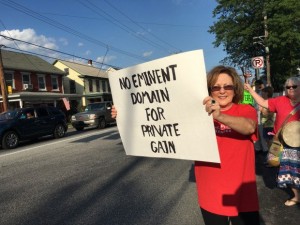WV Supreme Court sides with landowners on unauthorized gas line surveys
From an Article by Ken Ward Jr., Charleston WV Gazette – Mail, November 15, 2016
Developers of the proposed Mountain Valley Pipeline cannot survey land for the project without the permission of the landowners, the West Virginia Supreme Court ruled Tuesday. Justices upheld an August 2015 ruling by Monroe County Circuit Judge Robert A. Irons in favor of Bryan and Doris McCurdy, residents of the county who argued that allowing the pipeline company onto their property without their permission violates a basic right of all West Virginians.
Justice Robin Jean Davis, writing for the majority, said there was no proof that the MVP project would serve any “public use,” a requirement under state law for developers to use eminent domain to force landowners to allow such surveys.“Thus, this case represents exactly the type of private taking for private use that is prohibited,” Davis wrote in a 31-page opinion.
The Mountain Valley Pipeline would run about 300 miles from northwestern West Virginia to southern Virginia. It is a joint project of EQT Midstream Partners LP; NextEra US Gas Assets LLC; WGL Midstream; and Vega Midstream MVP LLC. EQT Midstream Partners will operate the pipeline and own a majority interest in the joint venture.
The developers say the pipeline would help carry the “vast supply of natural gas from the Marcellus and Utica shale formations to markets in the Mid- and South-Atlantic United States.” If completed, the project would extend the Equitrans transmission system in Wetzel County to Transcontinental Gas Pipeline’s compressor station in Pittsylvania County, Virginia.
In some parts of rural West Virginia, there are growing concerns about the impact on the environment and on small community life from the MVP project and about a variety of other natural gas pipeline projects that are at various stages of development.
At issue before the court was whether a West Virginia law that allows private companies to use eminent domain to take property — or survey property without owner permission — only if plans for the property by those private companies involve a specific “public use.” Earlier this year, pipeline promoters were concerned enough about the law that they tried unsuccessfully during the legislative session to get it changed.
“It just affirms what we have said since the beginning, that this company doesn’t have the right to come in and bully its way onto people’s property,” said Derek Teaney, an Appalachian Mountain Advocates lawyer for the landowners. “We’re glad to be able to protect the private property rights of all West Virginians.” A spokeswoman for the pipeline company did not respond to a request for comment on the decision.
In the court’s ruling, Davis noted that the MVP pipeline’s primary purpose would be to move gas from the producing regions of Northern West Virginia to markets in the Mid-Atlantic and Southeast regions of the United States. MVP, Davis noted, asserts that nearly all of the gas to be transported will be produced in West Virginia, and that the pipeline “will provide needed capacity for additional development of natural gas in West Virginia.”But, Davis said, no agreements have been reached that would provide gas to any consumers in West Virginia, and no “definitive evidence” that any non-MVP affiliated gas producers would benefit from the pipeline.
Justices Brent Benjamin and Margaret Workman joined in the majority opinon. Justice Allen H. Loughry II issued a concurring opinion to agree with the ruling, but “to stress the continued importance of the state’s eminent domain laws to our citizenry and to make clear that this Court’s ruling should not be viewed as a vote against the pipeline project.
”Chief Justice Menis Ketchum issued a dissent in which he said he doesn’t think private companies should be able to exercise eminent domain but that the Legisalture has decided otherwise. Ketchum also argued in favor of a broader definition of “public use” than the majority opinion allowed, saying that many West Virginians might, indeed, benefit from the MVP project. “There is no doubt that the natural gas transportation pipeline will enlarge West Virginia resources, increase industrial energies, and promote productive power in West Virginia,” Ketchum wrote. “Moreover, it will increase prosperity in West Virginia through the increased amount of severance tax collected on natural gas extracted from West Virginia land.
”In her majority opinion, though, Judge Davis cited earlier cases that defined a “public use” as not necessarily one in which “the general prosperity of the community is promoted” but as situations where “the general public must have a right to a certain definite use” of the private property that’s being taken by eminent domain.
Reference: Appalachian Mountain Advocates
See also: www.FrackCheckWV.net

